Praful Bidwai, March 16, 2007
By ordering police to open fire on peasants trying to protect their land from being acquired for a Special Economic Zone (SEZ), the communist government of West Bengal state has indicated the crumbling away of the last bulwark in India against neo-liberal and free market policies.
At least 15 people died and over 50 were injured by police firing on Wednesday in Nandigram leading to serious rifts within the Left Front coalition that is supposed to rule West Bengal but where power is monopolised by the Communist Party of India-Marxist (CPI-M).
Since the firing, Nandigram has witnessed unceasing confrontation between the state police and CPI-M cadres, on the one hand, and local residents organised under the banners of various political parties and non-party groupings, on the other.
After the initial shock and fear that sent them fleeing, people belonging to five villages in the Nandigram area, about 150 km from West Bengal's capital Kolkata, have regrouped and are now fighting the police and demanding to know the whereabouts of their missing relatives.
"The people claim that the number of those killed is much higher than the official figure of 15, and that the police and CPI-M cadres are burying bodies under rubble and building roads and culverts over them," said Aditi Chowdhury, a Kolkata-based social activist who has been following developments in the area, where trouble first erupted two-and-a-half months ago over the acquisition of land for the construction of an SEZ.
Speaking with IPS over telephone Chowdhury said: "Thousands of armed policemen surrounded the villages, and on many occasions they fired at eye-level to kill. TV footage showed trucks carrying bodies with their legs dangling out. The brutality was chilling.'' She added that state Chief Minister Buddhadeb Bhattacharjee' s brazen defence of the firing, as part of an attempt to restore law and order in the area, has only occasioned more public anger.
The Nandigram events, in particular the police firing, have seriously dented the image of the Left Front, which has ruled the state for an uninterrupted three decades -- considered a global record in democracy and electoral politics.
The CPI-M's main partners in the Left Front -- which includes the Communist Party of India (CPI), the Forward Bloc, and the Revolutionary Socialist Party (RSP) -- are livid and have publicly deplored the resort to repression. They are alarmed at the blatant contradiction between what the Left preaches at the national level, and what it practises in the states where it is in power – West Bengal and to a lesser extent in southern Kerala.
Like West Bengal, Kerala has also been looking to foreign investment to help generate employment for its skilled workforce. But its Chief Minister V.S. Achuthanandan, once a factory worker himself, has stuck to transparent functioning and a pro-poor approach in dealing with foreign investors keen to set up software parks in the 100 percent literate state.
In West Bengal, Bhattacharjee advocates the zealous pursuit of industrialisation at any cost, if necessary by offering concessions and tax breaks to investors, of a kind which the Left Front has always regarded as "crony capitalists" .
CPI general secretary A. B. Bardhan strongly condemned the police action in Nandigram as "unheard of" in the Left Front's history and a black-mark in its record. The party's West Bengal secretary Manju Majumdar called it "brutal and barbaric." Forward Bloc general secretary Ashok Ghosh said the incident "has tarnished the image of the Left Front." And senior RSP leader Kshiti Goswami rhetorically asked: "Does democracy exist in this state or not?"
Together these partners hold a total of 51 seats in the 294-strong legislative assembly, as compared to the CPI-M's overwhelming 176 seats. They have long complained, usually off the record, that they are not consulted by the CPI-M while taking major decisions on behalf of the government. But Nandigram has given them a new voice.
The dissidents in the Left Front have found a strong supporter in the grand old man of West Bengal politics, CPI-M politburo member and former chief minister Jyoti Basu. He told the Left Front chairman Biman Bose that the CPI-M was running "one-party rule in this state. It doesn't look like a coalition government at allà" Basu has asked the Chief Minister to own up responsibility.
Clearly there are serious misgivings about Nandigram and Bhattacharjee' s industrialisation policy within the CPI-M too. These are voiced in private by party leaders and especially intellectuals who are bitterly but cogently critical of neo-liberal or free-market policies.
Bhattacharjee is inured to such concerns. He has been rooting for private sector-led industrialisation as a panacea for the state's economic woes. He is pushing through an automobile factory for the Tatas, one of India's foremost business groups, at Singur in the face of staunch opposition from peasants who are being forced to sell their land under the colonial Land Acquisition Act of 1894.
Nationally, the Left Front demands abrogation of this law because it allows the state to expropriate land to be used for private profit.
The Tatas are also being offered huge subsidies at Singur, of the order of one-fourth of their capital investment.
Bhattacharjee shelved land acquisition plans for the Nandigram SEZ because of powerful protests in early January, and because the CPI-M politburo asked him to put all SEZs on hold in line with the central government's own decision to do so until after a national
rehabilitation policy is finalised.
But, as the influential Times of India daily pointed out in an editorial on Friday, `'the offer to withdraw the notification for land acquisition and shift the SEZ project elsewhere seems like a ruse meant to distract the villagers who had barricaded the area''.
SEZs have become intensely unpopular in India because they are widely seen as "sweetheart deals" which offer huge tax breaks and privileged treatment to promoters and exporters at the expense of the public exchequer. Even the World Bank has expressed misgivings about SEZs.
Originally, 10,000 acres of land were meant to be acquired for the Nandigram SEZ to be awarded to the Salim conglomerate of Indonesia, which is believed to be a front for the super-corrupt Suharto family. There is a great deal of unease in the CPI-M and the Left Front about favouring this group.
Why did Bhattacharjee resort to draconian police action after the Nandigram SEZ was shelved? He claims the state had to reestablish its writ and law-and-order, which had broken down; the area was blockaded to government functionaries for two-and-a-half months.
"The rest of the answer lies in the CPI-M organisational structure in West Bengal," says Tanika Sarkar, a modern Indian historian who visited Nandigram to inquire into the violence there in January.
Speaking with IPS, she explained that the CPI-M cadres control the entire area and have a stake in all major economic transactions. `'It won't brook any challenge to its monopoly of power. Yet, when the protests against land acquisition broke out on Jan. 7, and the cadres tried to suppress them, they faced the people's anger. Many were driven out. The have been itching to return and reestablish their hold."
Sarkar said the CPI-M cadres knew that they could only return to Nandigram by relying on police support. `'That's what the latest operation was all about. Brutalising ordinary people and denting the party's credibility as a pro-poor organisation is the price the CPI-M had to pay to please its local cadres."
Nandigram has major implications for the Left's future in India. Of the country's many political parties, the Left alone has a coherent critique of neo-liberal policies, which are creating havoc through their vicious dualism, contribution to widening disparities, and
callousness towards the poor.
If the Left embraces neo-liberalism in West Bengal, and tries to attract corporate investment irrespective of whether it generates employment and skills, that will damage its credibility, and weaken its ability to act as a progressive pressure-group to rein in the
aggressively pro-liberalisation Manmohan Singh government at the centre.
It is in pursuit of the pressure-group role that Left Front supports the Singh government from the outside rather than join in the federal government.
India's Left parties today enjoy their highest-ever representation in Parliament. Their credibility and respect far exceeds their membership or political representation. They are best placed to develop an alternative model of development that is not predatory on people's livelihoods.
"But this won't happen unless the Left, in particular the CPI-M, stops its own rightward drift," argues the noted political scientist Achin Vanaik. `'If it fails to correct course, it will undergo rapid decline,'' said Vanaik who teaches political science at Delhi University.
http://www.sanhati.com
सीपीएम की क्रांति
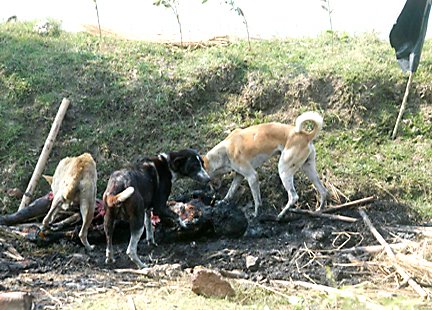
हम एक लोकतंत्र में रह रहे हैं! 14 मार्च को हुई घटना और उसके बाद सीपीएम के बंद के दौरान गायब हुए दो सौ लोगों का अब तक कोई अता-पता नहीं है्. हां। कुछ लाशें हैं जो इलाके में इस हालत में पायी गयी हैं. क्या हम बता सकते हैं कि इन्होंने किस बात की कीमत चुकायी? क्या हम इसको लेकर आश्वस्त रह सकते हं कि हमें भी कभी ऐसी ही कीमत नहीं चुकानी पड़ेगी?
Monday, March 19, 2007
Subscribe to:
Post Comments (Atom)
नंदीग्राम पर नयी फ़िल्म
यह फ़िल्म 14 मार्च की घटनाओं के सूक्ष्म विवरण के साथ आयी है.
देखें : नव उदारवाद का नया चेहरा बजरिये नंदीग्राम
देखें : विकास के नाम पर लोगों के उजड़ने की कहानी
उन्होंने मेरे पिता को टुकडों में काट डाला
देखें : न हन्यते
नंदीग्राम में 100 से ज्यादा लोग मारे गये हैं, 200 अब भी लापता हैं. वहां महिलाओं के साथ सीपीएम के कैडरों ने बलात्कार किया. बच्चों तक को नहीं छोड़ा गया है. सीपीएम की इस क्रूरता और निर्लज्जता का विरोध होना चाहिए. हमें नंदीग्राम, सिंगूर और हर उस जगह के किसानों के आंदोलन का समर्थन करना चाहिए, जो अपनी जमीन बचाने के लिए लड़ाई लड़ रहे हैं. यह दस्तावेज़ी फ़िल्म किसानों के इसी संघर्ष के बारे में है. यह फ़िल्म नंदीग्राम के ताज़ा नरसंहार से पहले बनायी गयी थी.
नंदीग्राम में जनसंहार के बाद के द्श्य
यह फिल्म पुलिस द्वारा नंदीग्राम में बर्बर तरीके से की गयी हत्याओं एवं उनकी भयावहता व बर्बरता के बारे में है. इसके कई दृ़श्य विचलित कर देनेवाले हैं.
नंदीग्राम प्रतिरोध्
नंदीग्राम में सरकारी आतंक
देखें : माकपा की गुंडागर्दी
नंदीग्राम में सीपीएम सरकार की पुलिस ने जो बर्बर कार्रवाई की, वह अब खुल कर सामने आने लगी है. यह फ़िल्म उसी बर्बरता के बारे में है. इसके कई दृश्य आपको विचलित कर सकते हैं. आप इसे तभी देखें जब आप वीभत्स दृश्य देख सकने की क्षमता रखते हों. हम खुद शर्मिंदा हैं कि हमें ऐसे दृश्य आपको दिखाने पड़ रहे हैं, पर ये आज की हकीकत हैं. इनसे कैसे मुंह मोडा़ जा सकता है?

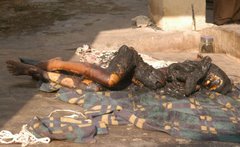
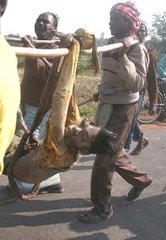
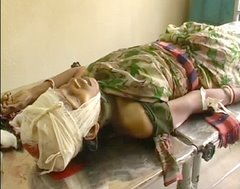

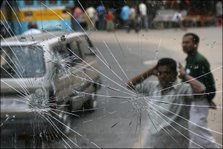
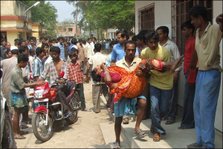

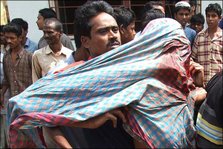


No comments:
Post a Comment